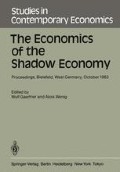Abstract
Repressed inflation arises under central planning when excess demand on the consumer goods market does not lead to appropriate price increases. If prices in the second economy are allowed to increase the excess demand would seem to disappear. In reality this process would only partly take place and “speculative” money balances for future purchases in the first economy would arise. The accumulation of these balances is a rising function of the price-difference (between the second and first economy) ratio and of the probability of buying on the first market in the future, and a falling function of the pure rate of time preference.
Access this chapter
Tax calculation will be finalised at checkout
Purchases are for personal use only
Preview
Unable to display preview. Download preview PDF.
Literature
Gregory GROSSMAN (1977), The Second Economy of the USSR, in: Problems of Communism, Vol. 26 (September-October).
Gregory GROSSMAN (1979), Notes on the Illegal Private Economy and Corruption, in: Soviet Economy in a Time of Change. A Compendium of Papers submitted to the Joint Economic Committee of the US Congress. Vol. 1, October 10, 1979, US Government Printing Office, Washington, D.C. 1979.
Michal KALECKI (1971), Selected Essays on the Dynamics of the Capitalist Economy, Cambridge University Press.
Erich KLINKMÜLLER and Gert LEPTIN (1983), Terminologische Anmerkungen zum Begriff der Schattenwirtschaft, in: Beiträge zum Problem der Schattenwirtschaft, Duncker & Humblot, Berlin.
Janos KORNAI (1971), Anti-Equilibrium. On Economic Systems Theory and the Tasks of Research, North Holland Publishing Company, Amsterdam.
Janos KORNAI (1980), Economics of Shortage, North Holland Publishing Company, Amsterdam.
Janos KORNAI (1982), Growth, Shortage and Efficiency, Basil Blackwell, Oxford.
Mieczyslaw KUCHARSKI (1972), Pieniadz-Dochod-Proporcje wzrostu, PWE Warszawa.
Dennis O’HEARN (1980), The Consumer Second Economy: Size and Effects, in: Soviet Studies, Vol. XXXII, No. 2, April.
Author information
Authors and Affiliations
Editor information
Editors and Affiliations
Rights and permissions
Copyright information
© 1985 Springer-Verlag Berlin Heidelberg
About this paper
Cite this paper
Brus, W., Laski, K. (1985). Repressed Inflation and Second Economy under Central Planning. In: Gaertner, W., Wenig, A. (eds) The Economics of the Shadow Economy. Studies in Contemporary Economics, vol 15. Springer, Berlin, Heidelberg. https://doi.org/10.1007/978-3-642-88408-5_24
Download citation
DOI: https://doi.org/10.1007/978-3-642-88408-5_24
Publisher Name: Springer, Berlin, Heidelberg
Print ISBN: 978-3-540-15095-4
Online ISBN: 978-3-642-88408-5
eBook Packages: Springer Book Archive

